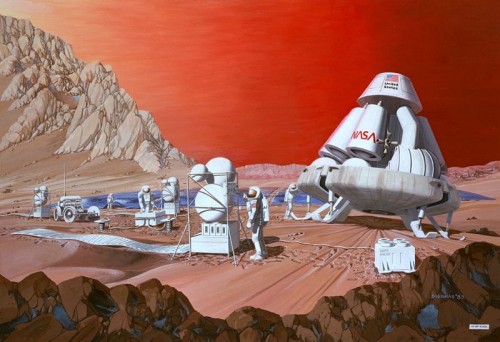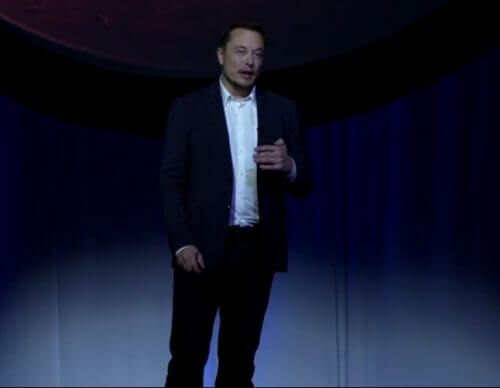Andrew Coates, professor of physics at University College London, wants to postpone manned flights to Mars until it is finally established that the planet does not have life of its own

Author Andrew Coates, Professor of Physics and Solar System Researcher, Deputy Director of the Mallard Space Science Laboratory, University College London
The founder of Space X and Telsa has a vision to colonize Mars, based on a large rocket, nuclear explosions and infrastructure to move millions of people there. It seems very ambitious but technologically challenging in several ways. The star protection laws and the difficulties in grounding (making a star habitable by, for example, raising its temperature) and dealing with the harsh radiation were mentioned as serious obstacles.
Undaunted, Musk took the first step toward his goal in February of this year with the launch of the Tesla Roadstar car into orbit beyond Mars on the first Falcon Heavy rocket. This is a dramatic demonstration of the growing ability to launch future missions made possible by partnerships between private and government entities.
But after six months, the plans start to look more like a fantasy. We have since learned that there could be life below the surface of Mars and that the grounding of the surface might be impossible.
The possibility that life may now exist on the Red Planet was raised last week when scientists reported the discovery of a lake of salty water beneath the surface of Mars. The lake will be 1.5 km below the South Pole dome and at least 20 km in diameter. They found this from an analysis of underground radar data from the Mars Express spacecraft. The water is thought to be salty, with magnesium, calcium and sodium perchlorate salts apparently acting as an antifreeze at temperatures as low as 200K (-73.15°C).
This is exciting and is the first definite discovery of liquid water on Mars, and there may be other deep lakes elsewhere on the planet. This means that there is a real possibility that there is now life on Mars.

We already knew that life could exist on Mars in the past. There is some evidence to suggest that Mars was habitable 3.8-4 billion years ago. Data from recent missions — including Mars Global Surveyor, Odyssey, Opportunity, Curiosity and Mars Express — have provided increasing evidence that there was water on the surface of the ground in streams and lakes with reasonable acidity, and the chemistry suitable for the development of life existed there around the time that life developed on Earth.
But Mars lost its magnetic field, which would have protected life from harsh radiation from space, 3.8 billion years ago. It also meant that its atmosphere began to leak into space, and it became less and less habitable. So it is possible that living things did not survive.
The new discovery may fuel the dreams of those who aspire to establish colonies where the water of the underground lake can be used to support the presence of humans, but the reality is very different.
The danger of contamination means that humans should not be sent there before we know for sure whether there is life that has evolved naturally - and that could take years to decades. We will have to drill underground and analyze samples, either in situ or from material that will be returned to Earth, and find suitable biomarkers to be sure.
The nationalization plans collapsed?
And perhaps more importantly, the long-held idea of colonizing Mars is now firmly locked in the realm of science fiction. Musk has previously stated that he wants to extend the planet so that it is more like the Earth, so that we can "eventually walk around outside without wearing anything." The easiest way to do this is by creating an atmosphere made of heat-trapping greenhouse gases locked in the star's ice to raise its temperature and pressure. Musk said he could drop thermonuclear bombs on the ice at the poles to heat it up to release the carbon dioxide.
But according to new research, published in Nature Astronomy, Mars has lost so much of its potential greenhouse gases to space over billions of years that it is now impossible to make the remaining atmosphere breathable with existing technology.
The study is based on measurements of the current escape rate of gases into space measured by Mars Express over the past 15 years and MAVEN over the past four years. They can teach us how much greenhouse gases, carbon dioxide and effective water are available on Mars. The measurements, together with knowledge of the carbon dioxide and water reserves on Mars from recent space missions, show that the greenhouse gases locked in the ice caps are not enough to provide the heat that is needed.
There may be more deep within the star but their output is far beyond today's technology. Also, the loss of the atmosphere is still ongoing due to the absence of a magnetic field, so it will need to be slowed down somehow to maintain any change achieved by grounding. This means that the potential explorers will have to use walls, roofs or heavy, sealed buildings to provide the right atmosphere and the necessary shielding from cosmic radiation.
Musk may be disappointed by these new results, but most Martian scientists are breathing a sigh of relief. There may be life on Mars now or there was in the past, and now we can focus on finding it.
We will look for signs of life using the vehicle of the European Space Agency and Russia's ExoMars 2020 mission, and NASA's Mars 2020 mission will collect samples that will eventually be returned to Earth-facing laboratories by around 2030. From the results of all these we may learn whether there were, are or could be Live somewhere else. In our solar system the best targets are Mars, Saturn's moon Enceladus and Jupiter's moons Europa and Titan. And these are just hints of the potential for life in the many stars beyond our solar system.
Mars is bright in our sky as on July 31st it was at its brightest since 2003. The red planet is never far from our thoughts, whether as a potential cradle for life beyond Earth or a destination for humans in the future. We live in exciting times when it comes to space exploration. So let's not destroy one of humanity's greatest and most fundamental experiments by allowing dreams of establishing colonies to go too far - at least until we know if there is life.
For the article in THECONVERSATION
More of the topic in Hayadan:

8 תגובות
I wonder what kind of salary those people who are thinking of colonizing Mars get. Its average density is 3.95 grams per cubic meter. Mars has only a quarter of the surface of the Earth and its mass is only one tenth of the mass of the Earth. The gravity on Mars is about 38% of the gravity on Earth. The atmosphere of Mars is tenuous: the air pressure on the surface is only 10 millibars, only about 1% of the average pressure on the surface of the Earth. Temperature: ‑ minimum 140.15- Celsius ‑ average 63.15- Celsius ‑ maximum 5.15- Celsius. They are talking about a 6 degree rise in the Earth's temperature that will cause a global holocaust. How much energy is needed to heat the "pioneers" who will colonize Mars. How much oxygen and nitrogen are needed to create an atmosphere similar to ours. For me, those identified scientists would be fired immediately. Nonsense should be told elsewhere. All space exploration must be done by robots. They are almost as smart as humans. If they don't know something, let them ask the unidentified scientists. It seems to me that Mr. Mesk is a little crazy or doesn't know how to read scientific literature.
Drive carefully.
Yours.-Life
The earth will not become extinct, but will no longer allow human life (perhaps then it will even recover). It is scary to read that some intervention in nature on Mars is planned to allow life there as we know it. I wish that the doubt will continue for a long time and that man will avoid polluting the Martian environment. By the way, dear translator, although the writing is fluent and clear, but please, what is the name of Elon Musk's car company? And Titan is the moon of which planet?
Elon Musk is turning out more and more like a megalomaniac who has no grip on reality. There is already so much talk about Tesla and that day is not coming and probably won't come either...
I agree with what Andrew said!
In the absence of a magnetic field and the mass of Mars being small, gravity does not capture the atmosphere by gravity. That's why it evaporates. Everything that has been said has to do with creating an atmosphere, not maintaining it
what's the problem A magnetic field generator can be built. Although it should be a little big. There is water and carbon dioxide at the poles of Mars, and it is possible to target some comets that will hit Mars to add water and organic materials. Heating the surface of Mars with several large fusion reactors would release quantities of oxygen. Since the atmosphere of oxygen and carbon dioxide is a bit problematic, some additional gas will be added. Nitrogen, which is needed for plant growth, will be brought, for example, from Saturn's moons. The bacteria that probably live under a thin earth's crust are probably similar to those in the earth's soil from a biological point of view, since the exchange of rocks between these two planets has existed all the time for billions of years. This means that with the technology of another 10,000 years it will be possible to start a process that will take several thousand years. Then it will be possible to grow plants and animals there. This is how we can turn Mars into a flourishing planet that can support several billion people. The big question is not whether SpaceX will still exist in 15-20 thousand years, but whether the human race will still exist, under the auspices of dictators with a button to activate nuclear weapons.
Won't stop Musk's race and it's good he's there. Without it, space exploration is stuck in the journey to the moon in 1969? And the space shuttle of the 90s. Is there life there? Not tomorrow we will worship Mars. A colony does need to be established. Our planet is in danger of extinction
In the Mahavarta of the Indians, it is told about gods who descended from the sky and waged world wars with huge lairs. So the legend becomes something reasonable and realistic? Maybe we too are descendants of those who came down from the sky and started bombing everything